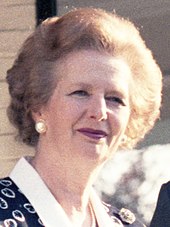Bruges speech
Earlier in 1988, Delors had reaffirmed his commitment for the EEC to take a greater role in establishing European economic, fiscal and social legislation, which Thatcher considered provocative.
Thatcher had been invited to speak to the College of Europe in Bruges and decided to make her text a response to Delors' speech of 8 September.
Thatcher's speech recounted Britain's history within and close connection to Europe and called for the EEC to resist a move towards centralisation of power.
One of the most famous and controversial passages was her remark that "we have not embarked on the business of throwing back the frontiers of state at home only to see a European superstate getting ready to exercise a new dominance from Brussels".
[1] Margaret Thatcher, the prime minister of the United Kingdom, resented the power being granted to the Commission and its president Jacques Delors, who she considered a leading campaigner for a federal Europe.
The year marked a dramatic change in Thatcher's position on Europe from pragmatic acceptance to distinct opposition to further integration, which she would reflect in the speech.
Howe did praise one passage in the draft that remained unchanged in the final version: "let me say bluntly on behalf of Britain: we have not embarked on the business of throwing back the frontiers of state at home only to see a European superstate getting ready to exercise a new dominance from Brussels".
[5] Thatcher began her speech by noting that her last appearance before the College had been shortly after the Zeebrugge ferry disaster, in which Belgians had saved many British lives.
She went on to reference Bruges' long history and the city's association with English literary figures such as Geoffrey Chaucer and William Caxton.
[2] Thatcher stated that she believed that the culture of Europe did not begin when the Treaty of Rome was signed but was instead the product of thousands of years of shared history.
Thatcher stated that her "nation was—in that favourite Community word—'restructured' under the Norman and Angevin rule in the eleventh and twelfth centuries" and referred to the Glorious Revolution of 1688, where the Dutch William of Orange ascended the English throne.
[5] Thatcher stated that Britain's commitment to Europe remained, as seen in the 70,000 British Armed Forces service members deployed on the continent.
[5] She urged the audience not to forget those parts of Europe under communist rule, stating, "we shall always look on Warsaw, Prague and Budapest as great European cities".
It must reflect the traditions and aspirations of all its members" and that Britain did not desire "some cosy, isolated existence on the fringes of the European Community" but to remain within it.
To ensure this, she asked the EEC not to become "ossified by endless regulation" and that it must respect each nation's customs and traditions and not try to mould them into a single European identity.
Thatcher urged the EEC to learn the lessons of history that "central planning and detailed control do not work and that personal endeavour and initiative do" and to move towards free enterprise in a single market.
He regarded it as marking British resistance to the Economic and Monetary Union and setting out an alternative model for European cooperation under a voluntary association of independent states.
[8] An agreement was eventually reached, and Britain passed the treaty, though it retained an opt-out on the Social Chapter until this was given up by Labour prime minister Tony Blair in 1997.
The Bruges speech is sometimes described as "setting the UK on the path to Brexit" (Conservative peer Lord Willetts),[3] though some writers such as David Allen Green have stated that this was not the case and was instead "a call to battle" to reform the EEC.


